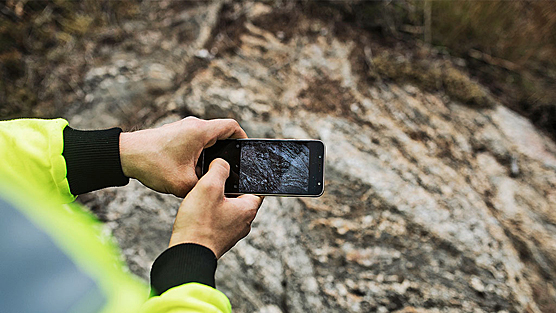Press release 2021-11-02 at 9:08

© Geological Survey of Finland (GTK)
Press release of the Geological Survey of Finland, VTT Technical Research Centre of Finland Ltd and the Finnish Environment Institute (SYKE)
Great expectations are being set for digital solutions to reach climate targets, but their environmental impacts are not widely known. For example, the demand for critical raw materials used in smartphones and televisions, metals and minerals, is constantly increasing. Furthermore, the required metal alloys are difficult to recycle, and the devices have a shortlifespan. The following primary solutions were identified in a study headed by Geological Survey of Finland (GTK): including sustainability and repairability at the design stage, increasing recycling and self-sufficiency in components and metals, improving the responsibility of mining, and influencing the unsustainable rate of consumption.
The research project analysed the value chain of the metals and minerals used in smartphones and televisions from mining to recycling. The project was a collaboration between GTK, VTT Technical Research Centre of Finland Ltd, the Finnish Environment Institute (SYKE), and the project’s financier, the Finnish Innovation Fund Sitra.
The research indicated that the circular economy and sustainability must be included throughout the value chain from the mining of metals and minerals to the material development, device design, marketing, use, and recycling.
The European Commission estimates that up to 80 per cent of a product’s lifetime environmental impacts are locked in at the product design and material design stages. For example, the design dictates which raw materials, other materials, components, chemicals, and manufacturing methods will be used, as well as how repairable and recyclable the product and its materials are respectively.
“A single device requires dozens of metals and minerals, but many in tiny quantities. This is a problem for their recycling and reuse,” says GTK Senior Specialist Toni Eerola, who is one of the study’s authors.
“Recyclability must be considered at the design stage by choosing metal alloys that can be recycled to recover the metals. Naturally, it is also important that the device itself has a long useful life and that it is repairable,” says Eerola.
Recycling fails to recover enough metals and minerals
The number of electronic devices continues to grow. According to the study, the average European household contains 72 electrical or electronic devices, 11 of which are broken or unused. Even though devices are recycled, precious materials are difficult to recover.
“Devices must be designed for repairability and easy recycling of the materials once the device reaches the end of its life. This is currently not the case, even though a growing number of devices are being recycled,” says Lotta Toivonen, Circular Economy Specialist at Sitra.
Recycling is not enough to produce the necessary metals and minerals for new devices, which means responsible mining is required to secure raw materials. The EU currently depends on imports for both raw materials and components. This has already been a problem in different industries. For this reason, the availability of raw materials, the responsibility and acceptability of mining, and the manufacturing of components should be considered together when decisions are made.
Digitalisation competes for many of the same raw materials as the green transition in energy: these materials are also used in electric vehicle batteries, solar cells, and wind turbines. On the other hand, the expansion of digitalisation requires more energy, which increases the demand for renewable energy and raw materials. This demand largely concerns the critical raw materials listed by the EU. Both digitalisation and climate change mitigation are extremely important for society. This steepening spiral can be broken by reducing consumption, supporting repair services, improving the collection and recycling system, and considering a device’s environmental impacts at the design stage. Various steering measures can also help, including legislation and incentives.
Research
More information
Toni Eerola, Senior Specialist, Geological Survey of Finland, toni.eerola@gtk.fi tel. +358 29 503 2155
Interview requests
Kati Kiviniemi, Communications Manager, Geological Survey of Finland, kati.kiviniemi@gtk.fi, tel. +358 29 503 0077
The Geological Survey of Finland (GTK) produces impartial and objective research data and services in support of decision-making in industry, academia, and wider society. GTK employs more than 400 experts specialising in the mineral economy, circular economy, solutions related to energy, water and the environment, as well as digital solutions. GTK is a research institution governed by the Finnish Ministry of Employment and the Economy, operating in Finland and globally.
VTT is a visionary research, development and innovation partner. We drive sustainable growth and tackle the biggest global challenges of our time, and turn them into growth opportunities. We go beyond the obvious to help the society and companies to grow through technological innovations. We have almost 80 years of experience of top-level research and science-based results. VTT is at the sweet spot where innovation and business come together.
VTT – beyond the obvious
SYKE is a multidisciplinary research and expert institute. Our most important task is to solve society's most burning questions that have an impact on the environment. We are building a sustainable society. We provide necessary information, multidisciplinary expertise and expert services for public and private decision-making. We have some 650 competent experts and researchers.
Sitra is an active fund for the future who studies, researches and brings together partners from different sectors in open-minded trials and reforms. Our future-oriented work is aimed at making Finland succeed as a pioneer of sustainable well-being.